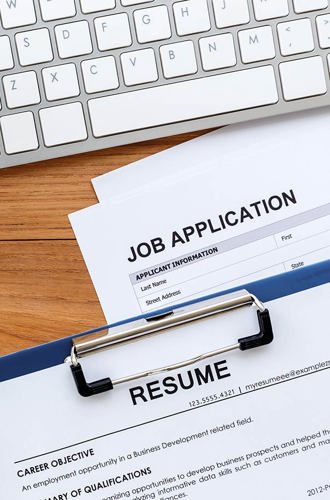Even if you haven’t served time, having a criminal record can make it harder for you to find work. But by taking the right steps, you can land a job.
Jump to:
If you are applying for a job
Most employers in Alberta can legally ask about criminal charges or convictions on job applications and in interviews. They can also conduct police information checks or security screenings. They can choose not to hire you based on what they find.
Employers in federally regulated organizations, such as chartered banks and airlines, are governed by the Canadian Human Rights Act. It protects you from discrimination—and not being hired—but only if you’ve been granted a record suspension, previously known as a pardon. For a list of federally regulated employers, visit Employment and Social Development Canada.
Some employers may look at the nature of your offence and how long ago it happened. They may decide your record isn’t an issue. Different employers require different levels or types of screening in their hiring procedures. In some industries, such as counselling, social work, or health care, a criminal record may close doors.
A criminal record can affect your ability to land a job. But it can also affect your ability to cross the border for training, or to attend a tradeshow or conference.
Depending on your offence, you may be eligible to apply for and obtain a record suspension (formerly known as a pardon). Visit the Parole Board of Canada for more information on record suspension eligibility.
You can only apply for a record destruction if you were charged but not convicted or found guilty of a charge.
Answer truthfully
When you are applying for a job, don’t lie about a criminal record and hope no one finds out. Your employer may learn about your background if:
- Your references mention it.
- Your parole or probation officer visits or calls you at work.
- You need time off to attend mandatory programs or court dates.
If you’re not required to provide or consent to a criminal record check, you do not have to disclose or mention it. This is also true if you are not asked about your criminal record. You will likely clear a criminal record check if you were:
- Charged or arrested but not convicted
- Referred to alternative measures (for example, an anger management course or community service) and have completed all the requirements
- Granted a record suspension
You may be asked if you’re bondable. This means an employer can take out insurance against the possibility that you might steal. Depending on the nature of your conviction, this insurance may be expensive or hard to get. But having a record does not necessarily mean you aren’t bondable. Check with your local police department to find out how your record may affect your ability to be bonded.
How to answer on an application form
Your goal in filling out the application is to gain an interview. The best time to talk about your record is when you are face to face with a potential employer. When questions about a criminal record appear on an application form, you have 3 options:
- Fill in only your name and contact information and attach your resumé to the form.
- Complete the form but leave the criminal record question blank. Plan to talk about the issue in the interview.
- On the form, answer “Yes. Let’s talk about it in an interview.”
What to put on your resumé
Don’t mention your record on your resumé.
If you have served time, look at different kinds of resumés before you decide which will be best for you.
Most employers prefer chronological or combination resumés. They may screen out candidates who don’t include detailed employment dates and histories on their resumés. A carefully designed combination resumé focusing on both skills and employment history may be your best choice.
However, you may think that a chronological or combination resumé draws too much attention to any gaps in your employment history. Instead, you could use a functional resumé, which allows you to focus on your skills.
Disclosing during the interview
You may not be asked about your record or required to complete the criminal record check process. In that case, you can decide whether to mention it at the interview. But if you are asked or choose to disclose your record, you should:
- Show that you have taken responsibility for your mistake. If you’ve paid the fine, written an apology, done the time, made restitution, or performed community service, say so.
- Say enough to be truthful. The employer doesn’t need to know all the details.
- Tell the interviewer what you’ve learned from your experience. Highlight the steps you’ve taken to change your life and move on.
- Bring a list of at least 3 names and their contact information as references. Choose references who recognize and support the positive changes you’re making in your life.
- If you’re disclosing without being asked, do so in the middle of the interview. This avoids making a bad first or last impression.
If you have just finished serving your sentence
With the right tools, information, and supports, you can find a job. These steps will set you on the right track:
Step 1: Identify the basics you may need help with
The basics are the details you’ll need to look after to show employers you are ready to work. They include:
- Identification, such as a birth certificate or driver’s licence. You’ll need identification to open a bank account, to access health care, and for other services. If you don’t have identification, see the Service Alberta website for an Alberta photo ID card. You may qualify for funding to get identification.
- An Alberta health care card. It covers visits to a doctor or psychiatrist, hospital visits and stays, and more. You can apply with proper identification.
- Work clothes and tools for the job that interests you.
- Transportation to and from work. Do you have a driver’s licence and a vehicle you can use? Or will you depend on a friend, a relative, or public transportation? Some larger cities offer subsidies for public transit.
- Adequate and safe housing.
- A bank account where an employer can deposit your pay.
- A way to communicate with employers, such as a cellphone or internet access.
Check out the community resources in Step 3 for help with some of these basics.
Step 2: Think about the life skills you’ll need for a job
Employers may expect you to demonstrate useful life skills, such as:
- Attitudes and behaviours suitable to the workplace
- Time management skills
- Communication skills
- Money management skills
- Self-esteem
If you feel some life skills are missing or need improving, you can work on them yourself or ask for help from community supports in the next step.
Step 3: Make use of community supports
Many in-person and online resources can help you explore career options and offer other kinds of support:
- Use CAREERinsite to complete online career planning.
- The alis website also has resources on occupations, career planning, education, and employment.
- Contact Alberta Supports for work search help.
- Check with your case management or parole officer to see if you are eligible for income support based on your conditions of release.
- Career and employment counsellors can help you overcome barriers you may face as you look for work.
- Contact 211 Alberta to ask about programs that support housing, employment, addiction recovery, finances, and more.
- Contact criminal justice societies such as the John Howard Society and (for women) the Elizabeth Fry Society in Edmonton or Calgary for help with housing, employment, record suspensions, financial literacy, and more.
Step 4: Develop a strategy for finding work
These suggestions will help you find work:
- Think about what you want in your life and develop a career plan for your future.
- Consider any skill-building programs you can take to improve your chances of being hired.
- Know how the conditions of your release will affect your work search and employment. Make sure you fulfil these conditions.
- Follow the advice above for filling out application forms, writing the right kind of resumé, disclosing your criminal record, choosing references, and answering interview questions.
- Identify types of work that may be more open to hiring someone with a criminal record. For example, a job that requires a background check or that has bonding requirements may be harder to land.
- Consider alternatives to a full-time job that will help you gain experience. These include volunteering, self-employment, or taking on part-time work.
You can find employment
Finding work with a criminal record may not be easy. But many have done it before you, and you too can succeed.
Maintain a positive outlook, identify the resources and skills you need, and look for help from government and community agencies. The rewards of employment make it all worthwhile.











